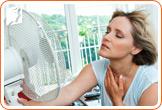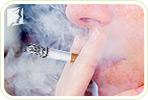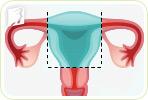
When you start to enter menopause, it can be a difficult and even bewildering experience. Every woman's menopausal experience is unique, but there are few universal, effective things you can do to avoid hot flashes and other bothersome symptoms.
Hot flashes are a problem for as many as three-quarters of menopausal women in the United States. They are, however, avoidable, treatable, and stoppable. Read on for some easy tips on preventing hot flashes.
Easy Steps to Avoid Hot Flashes
By understanding what a hot flash is, you can find simple, effective ways of reducing this menopausal problem. The following are a few of these strategies.
Check your breathing

Maintaining a good breathing rhythm helps to keep the body balanced. Fast, heavy breathing can worsen hot flashes, so if you feel an episode coming on, try breathing more slowly and deeply. Expand your rib cage to help relieve stress and regulate body temperature.
Keep cool

Room temperature and the clothes you wear are more important than you may realize. By ensuring that the air conditioning is on or you have a fan in every room, you can easily maintain a comfortable temperature. Also, layering clothing is beneficial, as you can add and remove pieces when your body temperature fluctuates.
Change your diet

A healthy body is especially important during menopause, and eating the right foods can help you avoid hot flashes. Steer clear of spicy foods and try to eat small, frequent meals, rather than a few big meals.
Eliminating spicy foods as well as caffeine, acidic foods, and dairy products is known to help menopausal women to avoid hot flashes.
Stay hydrated

Your body functions best when it is fully hydrated, and getting enough water is especially important in preventing hot flashes. Experts recommend consuming the equivalent of eight glasses of water each day.
Consider your lifestyle

There are many aspects of lifestyle that can trigger or worsen menopause symptoms, so adjusting your habits can be one of the most effective ways to avoid discomfort. Avoiding excessive consumption of caffeine, nicotine, and alcohol can make a world of difference in the frequency and severity of not only hot flashes, but all side effects of menopause.
More Information
As with most menopause symptoms, lifestyle changes, diet, and hydration are crucial to preventing hot flashes naturally. Hot flashes are caused by a hormonal fluctuation that confuses the hypothalamus in your brain and makes your body sweat suddenly and unexpectedly. Beyond lifestyle changes, there are herbal supplements and medications that may also help reduce discomfort during menopause.
Click on the link below for more information about hot flash treatments.
Sources
- National Health Service UK. (2015). Hot flushes: how to cope. Retrieved January 21, 2016, from http://www.nhs.uk/Livewell/menopause/Pages/hot-flushes.aspx
- Sikon, A. & Thacker, H. (2004). Treatment for Menopausal Hot Flashes. Cleveland Clinic Journal of Medicine, 71(7).
- Weir, E. (2004). Hot flashes ... in January. Canadian Medical Association Journal, 170(1), 39-40. Retrieved from http://www.ncbi.nlm.nih.gov/pmc/articles/PMC305309/


